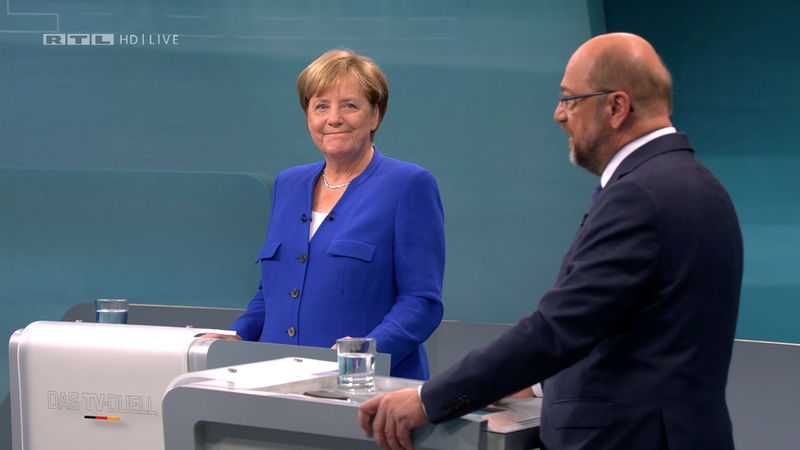By Paul Carrel
BERLIN (Reuters) - Firmly on course for re-election, Chancellor Angela Merkel on Wednesday spurned her rival's request for a re-run of a head-to-head television debate in which he failed to dent her opinion poll lead.
With voting taking place on Sept. 24, Martin Schulz's left-leaning Social Democrats (SPD) trail Merkel's conservatives by around 14 percentage points.
Schulz challenged her to a second debate in a letter, arguing that they failed to address many key issues in the first encounter on Sept. 3, billed as a one-off and in which he at times rattled the chancellor.
Her Christian Democratic Union (CDU) party rejected the idea, with an official saying: "Angela Merkel enjoyed taking part in the a TV duel. The format worked out well. And she is leaving it at that."
The SPD's Andrea Nahles, who is Germany's labor minister, accused the conservatives of cowardice for not allowing a second debate to tackle issues like health, education and pensions that she said were barely touched on in the Sept. 3 duel.
"In my view, this is weak of Mrs Merkel," she told Reuters in a television interview.
Schulz, 61, is a more natural public speaker than Merkel, 63, but he failed to land a knock-out blow during the debate -- partly because the two camps agree on many policy areas.
When he did try to stake out stronger positions, such as by accusing U.S. President Donald Trump of "bringing the world to the brink of crisis with his tweets", she was able to appear more considered.
Deploying her credentials as a global stateswoman, Merkel said she would work with Trump to achieve a diplomatic solution to the North Korea crisis -- a moderate approach that appealed to risk-averse German voters.
A survey by Infratest Dimap for ARD television after the debate showed Merkel's overall performance was viewed as more convincing by 55 percent, compared to 35 percent for Schulz.
In his letter to Merkel, a copy of which was seen by Reuters, Schulz argued they had not addressed voters' questions about the digital economy, the future of the labor market, pensions and education in the debate.
Schulz, whose SPD has ruled as junior partner in a 'grand coalition' with Merkel's conservatives for the last four years, has tried to appeal to voters with a campaign for social justice but the message has not resonated widely.

Merkel, in power since 2005, has told voters not to risk allowing an untested, SPD-led left-wing alliance to take power, urging them to stick with her in "turbulent times".